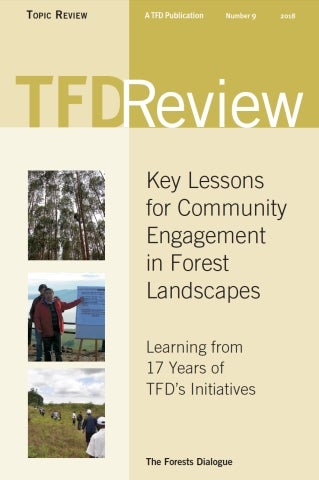Note: Yale School of the Environment (YSE) was formerly known as the Yale School of Forestry & Environmental Studies (F&ES). News articles and events posted prior to July 1, 2020 refer to the School's name at that time.
Forest landscapes are the target of commercial operations, management interventions, land use planning, infrastructure projects, conservation initiatives, and policy objectives by companies, organizations, and governments. In almost all cases, such activities take place in forests that are owned, used, or managed by local people (smallholders, pastoralists, indigenous peoples, etc.) holding prior rights to lands and resources, and have impacts on surrounding forest-dependent communities. Whether interested in valuable forest resources, sustainable forest management, or the land itself, diverse stakeholders from the private, public, and non-profit sectors must, in the interests of ensuring the success of projects and policies, negotiate with these communities to obtain consent and the social license to operate on their lands within a forest landscape.

Community engagement refers to the process through which this negotiation occurs, in which companies, organizations, and governments work to involve community stakeholder groups in forest policy, planning, and management decisions or project design and implementation. Intended to address and rectify the marginalization of forest-dependent communities, rights-holders, and forest users from decisions which affect their rights, livelihoods and well-being, community engagement is critical to the ability of non-community stakeholders to operate legitimately and effectively within a forest landscape.
Engagement can take many forms and can employ many strategies, from top-down approaches to joint management with communities; while it should begin at the outset of projects or policy design, the diversity of local contexts in forests precludes the creation of rigid frameworks or generalizable solutions. Moreover, stakeholder experiences of community engagement are not widely shared and are often unique to a particular context. Together, these difficulties constrain the relevance and comprehensiveness of guides for best practice.
To begin to fill this gap, a new review from The Forests Dialogue (TFD) seeks to share and synthesize the experiences of TFD dialogue participants, thought leaders, and partner organizations with community engagement in forest landscapes. By mining 17 years of TFD publications and case studies from the varied geographies in which TFD has conducted multi-stakeholder dialogues, and consolidating insights and experiences into ‘key lessons learned,’ this review aims to ground recommendations on community engagement — whether actionable or conceptual — based on the learning and discussions from TFD’s initiatives over the past two decades.
Download the full report (PDF)
The Forests Dialogue is a Yale-based program that promotes multi-stakeholder discussions on forest issues.
Engagement can take many forms and can employ many strategies, from top-down approaches to joint management with communities; while it should begin at the outset of projects or policy design, the diversity of local contexts in forests precludes the creation of rigid frameworks or generalizable solutions. Moreover, stakeholder experiences of community engagement are not widely shared and are often unique to a particular context. Together, these difficulties constrain the relevance and comprehensiveness of guides for best practice.
To begin to fill this gap, a new review from The Forests Dialogue (TFD) seeks to share and synthesize the experiences of TFD dialogue participants, thought leaders, and partner organizations with community engagement in forest landscapes. By mining 17 years of TFD publications and case studies from the varied geographies in which TFD has conducted multi-stakeholder dialogues, and consolidating insights and experiences into ‘key lessons learned,’ this review aims to ground recommendations on community engagement — whether actionable or conceptual — based on the learning and discussions from TFD’s initiatives over the past two decades.
Download the full report (PDF)
The Forests Dialogue is a Yale-based program that promotes multi-stakeholder discussions on forest issues.
Published
February 15, 2018